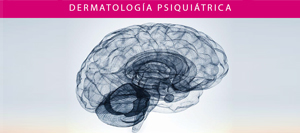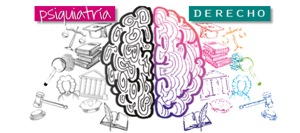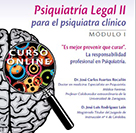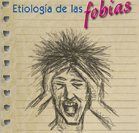
Training
PSYCHIATRY

Psychiatric dermatology
The skin is the organ in which the mind expresses itself more intensely and strikingly. This is proved by the colloquial language when we use expressions that, in an intuitive way, confirm this relationship. 'I get goose bumps when you tell me those things', 'I get red when you look at me', 'my hair bristles just thinking about it', 'my hands sweat when I have to go on stage', and so many Other examples that tell us about the cutaneous response to the influence of the mind.
From skin to mind
From mind to skin

Course on Psychiatry and Law
The constant interaction between legality and medicine means that every psychiatrist must have basic legal knowledge for a safer exercise of their profession to significantly reduce claims for civil liability, including claims filed with a court. Being aware of civil laws on legal capacity and the procedures for initiating or participating incapacitation procedures, the rights of psychiatric patients, how to act legally in cases of harassment or violence between patients or with the doctor, the limits applicable to admissions to psychiatric institutions and the concepts to be taken into account to ensure proper informed consent to endorse the professional's practice at a certain time are matters that concern every psychiatrist.

Scales of valuation in schizophrenia
Help for the classification of patients evaluated by internationally recognised scales: PANSS, BPRS, QLS and PSP
New course on biomarkers in the diagnosis of schizophrenia.

Behavioural addictions
In the last 25 years, information and communication technologies, mainly the Internet and mobile telephony, have rapidly become an integral part of society and an indispensable part of people's daily lives. Since the 1990s, the problematic use of these technologies has led to a remarkable increase in demand for treatment due to (individual and social) health problems caused by excessive use. The specialists who treat these patients have begun to consider these problematic uses as similar to those included in the group of behavioural addictions, such as pathological gambling. This is based on the clinical observation of said problematic users and on scientific information; they explore the biological basis of these anomalous behaviours, which are similar to those of substance addictions.
Addiction to technologies
Addiction to exercise
Addiction to work
Compulsive shopping
Addiction to gambling

Legal Psychiatry II, for the clinical psychiatrist
Forensic psychiatry is a subspecialty integrated into general psychiatry that deals, essentially, with clarifying those cases in which a person, due to the special state of their mental health, also requires special consideration before the legal system.
At the present time, knowing forensic psychiatry is not an option of the clinical psychiatrist, but on the one hand, a legal obligation to collaborate with the Administration of Justice, and on the other, a very appropriate way to avoid problems and conflicts in daily practice.
The course that we present to you tries to update certain concepts on forensic psychiatry, specifically on professional responsibility, prescription limits and psychiatric expertise that we detail in the program.
Module 1
Module 2
Module 3

Anxiety crises caused by phobias
Phobias are included under anxiety disorders and could be defined as illogical and disproportionate unease accompanied by a tendency to avoidance. At the end of the last century, Isaac Marks made a significant contribution to the current definition of the concept of phobia and offered a new classification. Phobias are one of the most frequent disorders in the population as a whole. According to the National Co-morbidity Study (NCS), 46% of the US population suffers from a phobia.
Aetiology of Phobias
Social Phobias
Agorafobia
Other Phobias

Course on adjustment disorders
Course on adjustment disorders: A high percentage of patients who visit their primary care practitioner essentially have symptoms of anxiety and depression. These symptoms are often part of an adjustment disorder which is dealt with by the patient with a high degree of stress and uncertainty, and the response of primary care practitioners is very often limited to symptomatic treatment. Although the symptoms are the reason for the consultation, they are not the real problem, which is either not addressed at all or treated non-specifically or superficially. This is often due to a lack of time, and sometimes due to ignorance of the specific available resources. Some of the situations that overwhelm us are frequent and require a specific approach.
That's why the course we offer, with 100 teaching hours, suggests a more comprehensive treatment which focuses on the triggering circumstance and not just on the disorder that it generates or the symptoms that it causes. This helps to provide a thorough and personalised approach for each patient.
Workplace Harassment
The Duel
Aging
Gender violence
Care of the dependent patient
Physical illness
Autolytic ideation
Severe mental disorder